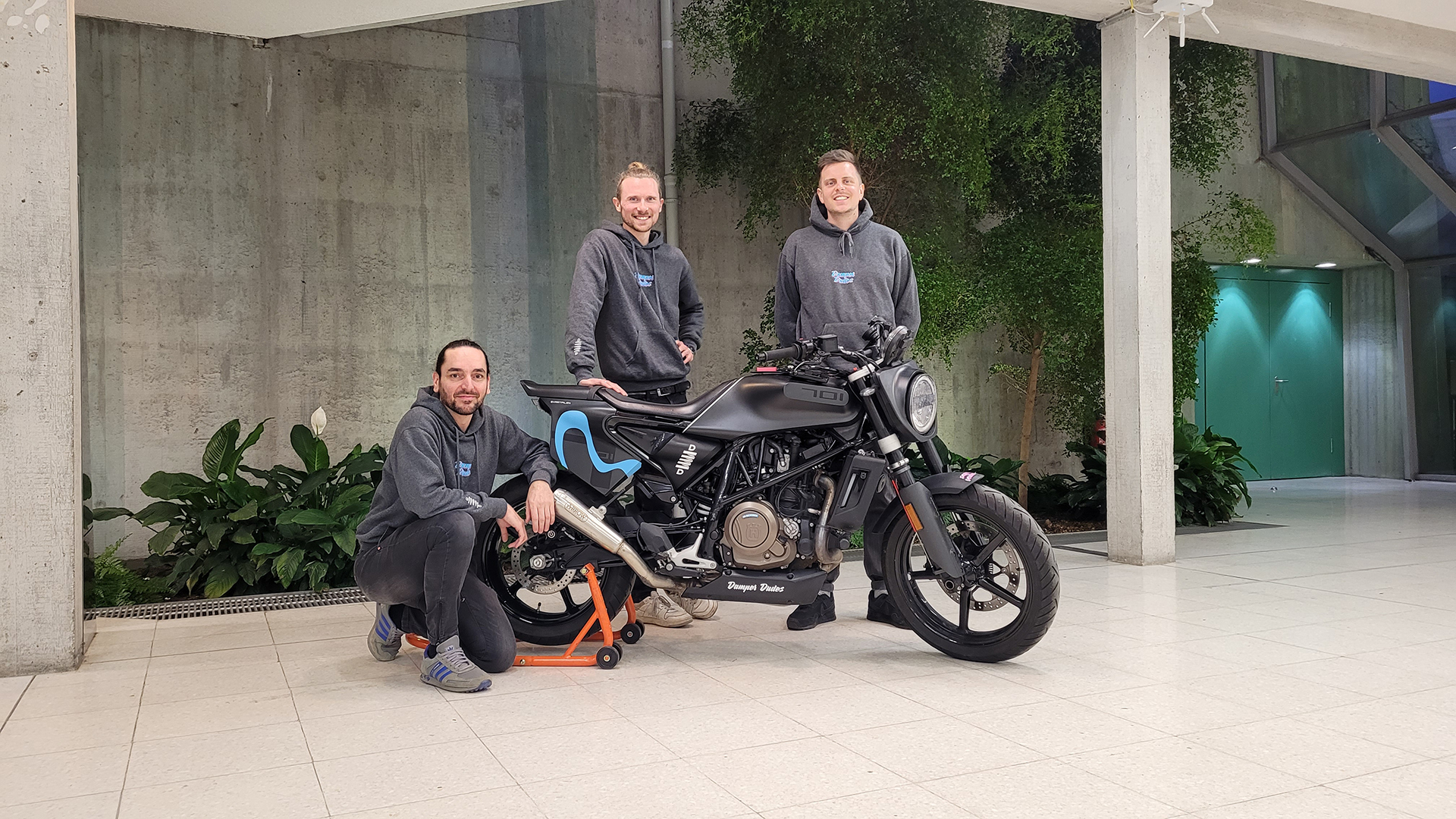Get on, start the engine and ride off: Unfortunately, it's not always that simple with motorbikes. The suspension of two-wheelers is usually set to standard values. As soon as a passenger or even another rider gets on, the set-up no longer works. If you have the technical skills, you can readjust the suspension every time you change the load. But that takes time. A quicker and, above all, safer solution is offered by retrofitting Aeroflex. The intelligent shock absorber for motorised two-wheelers is the first product from the Damper Dudes, who prepared for setting up a company as part of the ICM Early Ride program. However, the budding start-up is more than just a component manufacturer. The three founders see themselves on the way to becoming a think tank that transforms innovative technologies into applications. For example Aeroflex is home to technologies such as 3D-printed seals and shock absorber housings as well as lightweight construction materials.

Damper Dudes: Intelligent shock absorber for a safe motorbike rides
The Damper Dudes have developed an adaptive shock absorber for motorbikes at the Institute for Machine Elements. Their work at the University of Stuttgart led to a reorientation of their startup. From a component manufacturer to a development company that is open to many approaches, but with one goal in mind: to make riding motorised two-wheelers safer.

Good ideas for application-oriented projects
Adaptive suspensions are a gap in the market in the motorbike industry. BMW is the only major brand offering adaptive suspension for an extra charge since October. Otherwise, the rule in the industry is: one buyer, one suspension setting. However, this becomes impractical if the owner occasionally takes a passenger or goes on holidays with friends and luggage. Rental companies and driving schools, which constantly have customers of different weights on their bikes, accumulate garage hours in order to adapt the bikes to the changing needs of their customers. There is also a clear need for customisable chassis for sharing services, which play an important role in the future of two-wheeled mobility. The Damper Dudes are one of the first manufacturers to offer a retrofit option for this.
The Damper Dudes were founded in order to develop Aeroflex to series maturity and bring the system to market. This is why engineers Dominik Decker and Lennart Rackwitz also brought a marketing expert, Christoph Ruge, on board as a co-founder.
The small start-up has now outgrown its founding purpose. The three of them started out at the Institute for Machine Elements (IMA) at the University of Stuttgart with their EXIST start-up grant and funding from the Young Innovators Programme, where they took a liking to the world of science. "In our previous jobs in industry, we didn't have the experience of having the freedom to build a project from scratch," says Christoph. He and his co-founders appreciate the openness of academic research, which is free from corporate philosophies, budget restrictions or profit requirements.
They also want to preserve this freedom for their start-up. "Our company is currently developing into a think tank that pursues new approaches and research questions relating to two-wheel driving and modern mobility," says Lennart. Along the way, they are taking on young talents who come to them with interesting approaches. "We want to steer the many good ideas that are on the road here in a meaningful and application-oriented direction," says Dominik.
Two business fields, one goal
As chassis developers and mobility researchers, the Damper Dudes are pursuing a dual goal. They want to make riding motorised two-wheelers, from light motorbikes to powerful enduro bikes, safer. Aeroflex is already primarily a component that increases riding safety. "If the suspension is poorly adjusted to the weight, it doesn't absorb the load peaks, the rider reacts unsafely and the motorbike does too," explains Dominik. The right suspension setting also makes a difference on two-wheelers because it strongly influences the rider's perception of safety and thus the interaction between man and machine. Riding safety on motorbikes has a significant psychological component, which also leads to new research questions. The Damper Dudes want to address these together with the Institute for Two-Wheeler Safety (IFZ) and the ADAC. In addition, a driving experience demonstrator is being developed as part of the mobile research laboratory DEMO12 at the ICM, which can be used to analyse the human perception of vibrations affecting the body.
ICM Early Ride Program
The ICM Early Ride Program is an incubator program for innovation projects from the university environment in Baden-Württemberg with a strong focus on mobility and production. We help students, doctoral candidates and post-docs from research institutions to explore the potential of their research and awaken their entrepreneurial spirit.
- Information on the Early Ride Program
- Charging Time App - The solution to range anxiety
- BEHtec - Lightweight construction with natural fibers
- Litona - Sodium ion batteries
- MoThor Batteries - Replaceable battery cells
- ZeNo Battery Testing - Battery tests without battery
- Damper Dudes - Adaptive suspension strut for motorcycles
- Dyna Charge - Dynamic charging
Contact
Benjamin Büchner
Editorial and public relations, InnovationsCampus Future Mobility
E-Mail: medien(at)icm-bw.de









